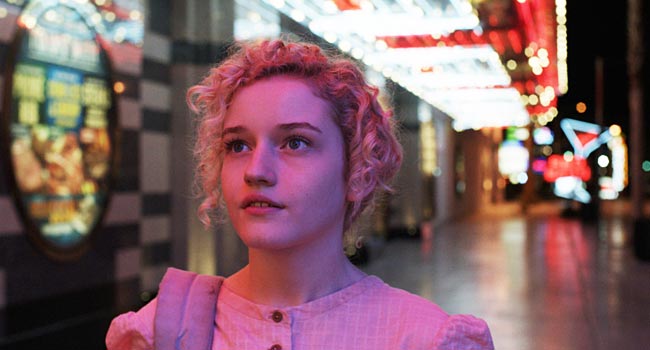
You might have seen movies about teenage pregnancy before, but you’ve never seen them done like this.

You might have seen movies about teenage pregnancy before, but you’ve never seen them done like this.
You might have seen movies about teenage pregnancy before, but you’ve never seen them done like this. In a refreshing take on the topic, Rebecca Thomas’ debut Electrick Children gives us a story of immaculate conception that is easy to love and wonderfully unique. Though it begins in a religious community, whether the pregnancy in question truly was immaculate conception or not is inconsequential; in a world of heightened possibility, we’re asked to suspend our disbelief in a far more uplifting manner than usual.
The film begins in a conservative Mormon colony in Utah, where 15 year old Rachel (Julia Garner) is interviewed about her faith by her pastor and father (Billy Zane). Rachel, who has never seen a tape recorder before, sneaks into the basement that night and finds herself listening to a blue tape, with a cover of The Nerves’ hit song “Hanging on the Telephone” recorded on it. The next thing we know, Rachel’s pregnant, and convinced that it was immaculate conception – that the holy spirit came to her through the man’s voice on the tape. Her mother, who caught Rachel and her brother Mr. Will (Liam Aiken) grappling over the tape on the floor that night, is not convinced, instead believing that Mr. Will forced himself on his sister. Mr. Will is exiled from the community, and an arranged marriage is organised for Rachel; but the young girl with a rebellious streak is convinced of her innocence and drives off in the night in hopes of finding the man on the tape, not realising that Mr. Will is asleep in the back of the truck.

And so, with her wide, curious eyes, we come to meet Las Vegas as though for the first time. A land of promise and electric paradise, it’s everything Rachel needs and more as she encounters a young group of skating stoner musicians, believing one of them to be the man on the tape. The contrast between her hometown in Utah, shot in nostalgic desaturated colour, and Vegas, with its neon lights and enchanting atmosphere, only serves to highlight the beauty of both, rather than display one as better than the other—and this consistent refusal to take the easy route of cutting down fundamentalist faith is what makes Thomas stand out even more as a director. There are plenty of comedic moments, as one would expect when two young traditionalist children are suddenly faced with the wasted youth of Sin City, but this humour never comes at the expense of Mormon culture.
As the story progresses, things do seem to be rather convenient, with one particular revelation seeming a little too felicitous for us to openly accept it, as the characters do. Though all of the characters are believable, they exist somewhere out of our reach, in a world of fantasy and exhilaration. Nevertheless, Rachel’s naivete is surprisingly believable, thanks both to her unwavering faith and to Julia Garner’s amazing performance. Garner is always naive without being stupid, and her big eyes and innocent face are more than perfect for the endless curiosity she portrays. The supporting cast are also fantastic, with a convincing Aiken as a boy newly discovering the pleasures of the world, and Rory Culkin’s surprisingly endearing performance as a forlorn runaway. With the intimate development of these characters and such genuinely unexpected turns throughout, it’s not hard for us to forgive any failures to fully reach its potential.
There have been many comparisons of this film to the 2011 drama Martha Marcy May Marlene, but though both films deal with fundamentalist religious communities in a way, the similarities end there. Electrick Children is far less condemning of such societies, instead rising above judgement to provide us with a film that is simply a tale of adolescent discovery wrapped in the warm glow of innocence. It lifts us up beyond issues of virtue and honour, into a sun-kissed kingdom so genuine it’s hard for us to be cynical. The story of a child growing up, it allows us to leave behind our own adulthood and the pessimism that comes with it, if only for a moment. Rachel tells us, “In the beginning was the word, and the word was with God, and the word was God.” But if I had to sum up this film in one word, that word would not be God, but beauty.